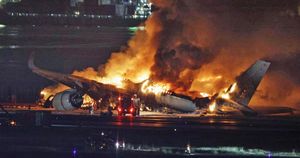Concerns surrounding global nuclear security are reaching new heights as recent developments involving both artificial intelligence and geopolitical tensions create uncertainty for the future. A significant move announced by OpenAI has sparked debate, as the organization will support U.S. National Laboratories with its AI models aimed at enhancing nuclear security. At the same time, the Iranian government is vocally warning against any military action targeting its nuclear facilities, which they fear could provoke all-out war in the already volatile Middle East.
According to reports from CBS, OpenAI's partnership with the U.S. National Laboratories has led to access for up to 15,000 scientists to utilize AI technology to improve nuclear safety and mitigate the risks of nuclear conflict. OpenAI CEO Sam Altman stated, "Our collaboration focuses on reducing the risk of nuclear war and securing nuclear materials and weapons worldwide." This initiative aims to leverage cutting-edge AI to address complex challenges associated with nuclear deterrence and secure management of nuclear arsenals.
While the promise of AI enhancing nuclear security is commendable, skepticism remains. Critics point to OpenAI's past issues with data management and inaccuracies, wondering just how effectively AI can be integrated without exposing sensitive information. The idea of utilizing AI to safeguard nuclear protocols has raised eyebrows, especially considering the potential ramifications of any system failures.
Adding to the mounting pressures around nuclear security, Iranian Foreign Minister Abbas Araghchi articulated severe warnings during his recent visit to Qatar. Speaking to Al Jazeera, he cautioned against any U.S. or Israeli military strikes on Iran's nuclear infrastructure, deeming it as one of the gravest historical errors the U.S. could make. He insisted, "Any attack would plunge the region directly toward all-out war," and vowed Iran's immediate and decisive retaliation against any aggression.
Araghchi's comments came at a time when tensions between Iran and the U.S. have escalated, particularly under the leadership of President Donald Trump, whose policies have been perceived as provocative. American officials and lawmakers, with sentiments similar to those expressed by Araghchi, have called for the U.S. to maintain strong deterrence capabilities against Tehran.
Reports of the resolution passed by the U.S. House and Senate affirm the urgency of addressing Iran's nuclear pursuits. Led by Senator Lindsey Graham, the bipartisan resolution asserts, "All options are on the table to prevent a nuclear-armed Iran." This development highlights the federal government's commitment to counter actively perceived threats from Tehran, which many lawmakers classify as existential to both Israel and regional allies.
At the Friday press briefing, White House Press Secretary Karoline Leavitt reiterated President Trump's tough stance on Iran's nuclear ambitions, echoing threats of retribution against Iran and its proxies. She emphasized the administration’s belief in taking strong measures if diplomatic negotiations do not yield the desired outcomes.
Despite these warnings, Araghchi has urged for dialogue, emphasizing Iran's willingness to engage directly with the U.S. on nuclear matters if relations can be improved. He pointed out how past hostilities, particularly the Trump administration's withdrawal from the nuclear agreement and the assassination of major Iranian military figures, have only increased mistrust. His calls for confidence-building measures highlight the potential for negotiation, albeit alongside the ironclad insistence on Iran's right to protect its national interests.
Meanwhile, Militaristic rhetoric has reverberated through the region, with Iran asserting its place within the broader geopolitical structure. There are growing fears among Middle East observers about the repercussions of heightened military activities surrounding Iranian facilities. Any miscalculation could lead to significant conflict, perpetuating cycles of violence.
The Israeli response to the situation has been one of vigilant preparation, with discussions among lawmakers and military officials on counteracting Iranian influence growing fierce. The recent conflict between Israel and Hamas has only exacerbated tensions, with Iranian officials framing the regional struggle as multi-faceted, inclusive of all conflicts against Israeli occupation, as Araghchi underscored the perceived victory for Hamas amid severe casualties.
Concerns about nuclear stability are not new but are undoubtedly more pressing within the current international milieu. The U.S.’s collaborations with technological ventures like OpenAI come against this backdrop of uncertainty, and their success could pivotally shape how threats are perceived and managed globally.
While some hope the integration of advanced technology resolves security challenges, the pitfalls of relying on unproven systems for such sensitive matters persist. The precarious dance between diplomacy, military power, and technological advancements must be navigated carefully to prevent history from repeating itself.
With conflicts burgeoning and deterrence at the forefront, the balance of power is more precarious than ever, underscoring the urgency for strategic international dialogue and collaborative efforts aimed first and foremost at safeguarding humanity from nuclear disaster.



